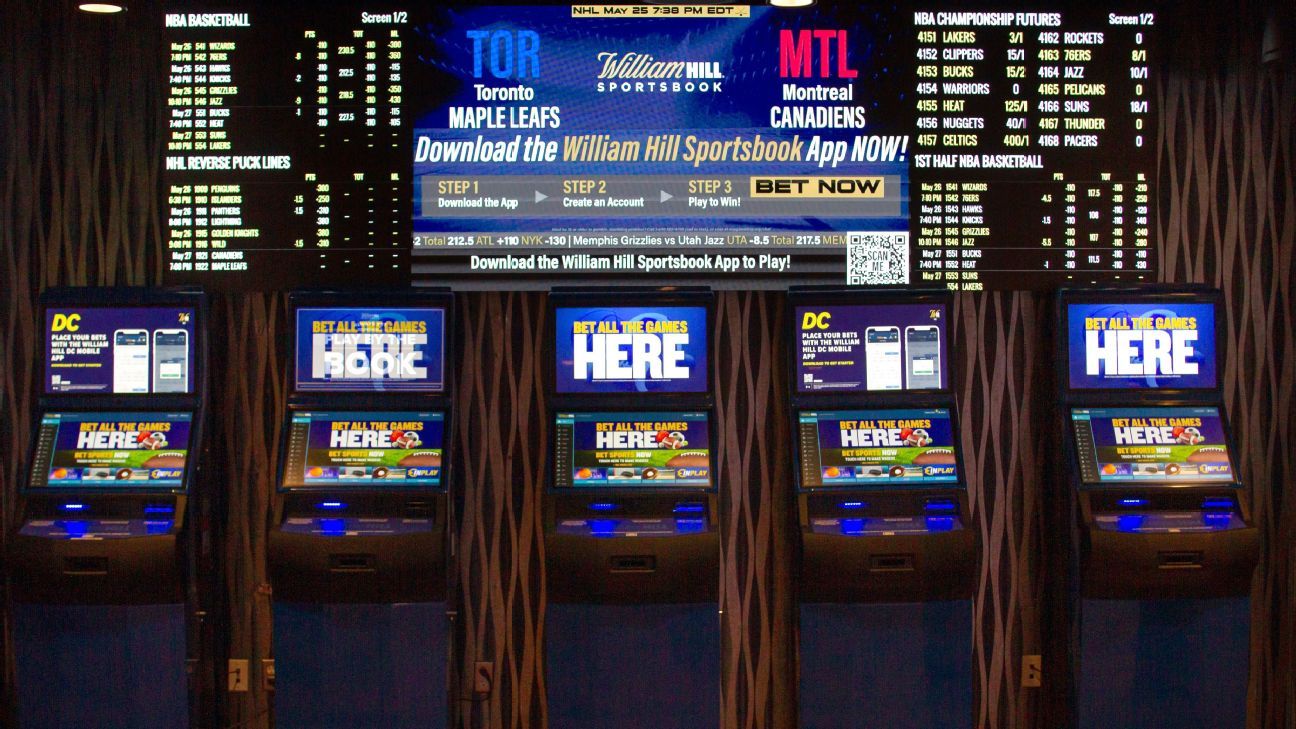The Washington Wizards hosted the Philadelphia 76ers on Saturday at Capital One Arena in the first playoff game at a U.S. venue where a legal bookmaker was accepting bets.
It was a monumental moment for American sports that warranted an appearance from NBA commissioner Adam Silver, who, along with 76ers owner Josh Harris, toured the new two-level William Hill sportsbook at Capital One Arena before the game tipped off.
Fans and bettors arrived at the arena sportsbook early in the afternoon to watch and bet on the Champions League final between Manchester City and Chelsea. At halftime of the Sixers-Wizards game, ticket-holders left their seats and walked into the sportsbook to place their bets, and customers stayed long after the game ended to watch the final playoff tilt of the night between the Jazz and Grizzlies. By the time it was all over, the Capital One Arena sportsbook had handled more money than it had in any day in a long time, William Hill vice president of strategy and business Dan Shapiro said.
“The place was busy and had an energy,” Shapiro said. “That was the great thing to see was the energy in the venue.”
Betting was allowed on the 76ers-Wizards game at the arena sportsbook. The game accounted for 40% of the money wagered on the NBA at the Washington, D.C. sportsbook on the day, according to data provided by William Hill. Shapiro said the D.C. book won “a little” on the 76ers’ 132-103 victory over the underdog Wizards but suffered a net loss on a day that saw all four NBA favorites cover the spread.
William Hill had been operating from the arena’s box office since the summer, before the permanent facility opened last week. Lines of bettors waiting to place their wagers have regularly formed and stretch down the entire block outside of the arena. The sportsbook, which is open seven days a week, features 17 betting windows, 13 self-serve kiosks, two bars and a full-service restaurant with local chef Nicholas Stefanelli.
Shapiro, who stayed hours after the Wizards game ended to check out the post-game atmosphere, said Stefanelli guaranteed him that “this is the busiest restaurant in D.C. right now.” “And he’s in the business,” Shapiro said.
Silver, who took selfies with fans and bettors during his pregame tour of the sportsbook, was an early proponent of regulating sports betting in the U.S.
“Outside of the United States, sports betting and other forms of gambling are popular, widely legal and subject to regulation,” Silver wrote in a 2014 op-ed in the New York Times, advocating for legalization. “In England, for example, a sports bet can be placed on a smartphone, at a stadium kiosk or even using a television remote control. In light of these domestic and global trends, the laws on sports betting should be changed.”
Four and a half years after Silver’s op-ed, in May 2018, the U.S. Supreme Court struck down the Professional and Amateur Sports Protection Act of 1992, the federal statute that had restricted legal sports betting to primarily Nevada. The Supreme Court decision opened a pathway for all states to get into the bookmaking business. Since the ruling, legal bookmakers have begun operating in 21 states and the District of Columbia, which, along with Illinois, allows sportsbooks to exist at professional sports venues.
In an interview with NBC Sports Washington, Silver applauded Wizards owner Ted Leonsis’ vision of the convergence of betting and sports, but said it was important for the league to look out for problem gambling and “make sure that we strike the right balance in the amount of betting promotion that happens around our games.”
“I’m very sensitive around it, but I think that for the vast majority of people it’s something that they can enjoy doing, betting relatively small amounts on the games,” Silver told NBC Sports Washington. “It leads to additional engagement around watching particular aspects of the game.”
